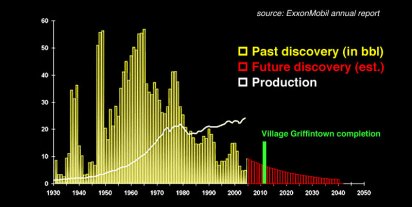by A.J. Kandy
Henry Aubin, writing in The Gazette, covers an interesting article from the Urban Land Institute. At least one firm echoed the feelings of many when they said that, if given $1 trillion to play with, they’d spend it de-automobilizing North America:
“We would spend less time fixing and more time dismantling America’s infrastructure,” say Dan Wood and Amale Andraos, of WORK Architecture in New York. “The 50-year suburban experiment in car culture is untenable in the face of climate change and peak oil.”
They would spend the money on, among other things, a “study of the suburbs to identify those that can be densified as new cities and those that can be returned to farmland.” They foresee a day when energy costs make long-distance food transport very costly, and more food will have to be locally grown.
That day might come sooner rather than later — most oil geologists believe that the “peak” in peak oil is now; we’re now going down the jagged, uneven slope of depletion. By 2012-2019 (when the Devimco project is due to be finished) spot shortages — or longer outages — in the supply of fossil fuels will start to be commonplace. Consider this graph, “The Growing Gap,” which I adapted from a recent ExxonMobil annual report, comparing diminished future discovery with escalating demand (production). I placed the estimated completion date of Projet Griffintown on the timeline, for comparison.
Seeing as how we’re not going to have the same one-time bonanza of fossil fuel energy going into the 2nd half of the 21st century, it’s a project we should have started on yesterday. (Places like Thornhill, ON will be the first to go — if you’re not already on a farm, that is.)
A simpler thing that almost all cities with dead areas / downtowns can do is change their zoning codes and tax codes. It should be cheaper to build in the middle of cities (encouraging infill and density), and more expensive to build far-flung exurbs which require enormous infrastructure outlays for very little density in return. Encouraging mixed-use, dense neighborhoods is the smartest thing any city can do right now; emphasis on neighborhood, not “Delta City.”




